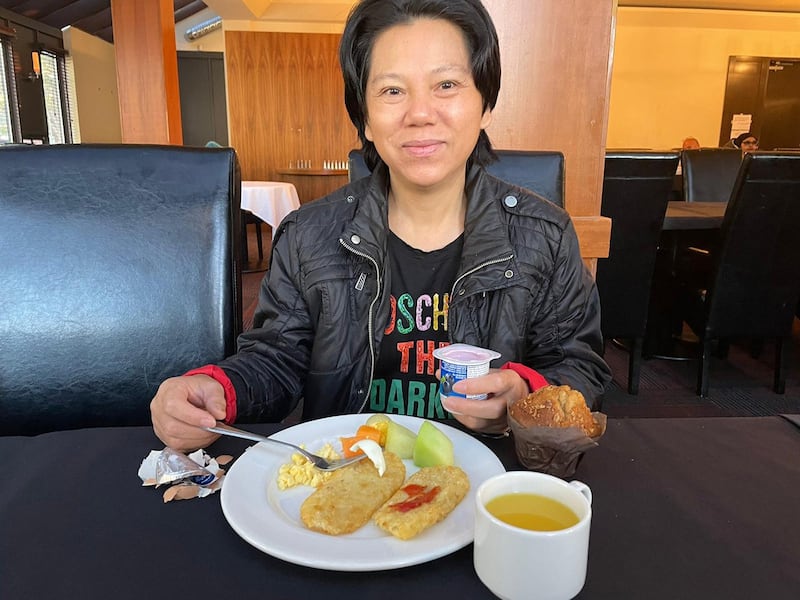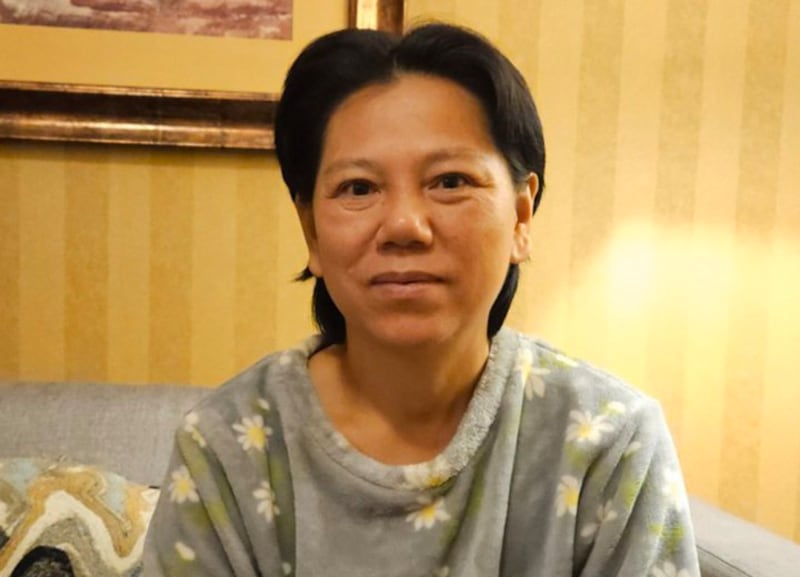A Chinese rights activist who recently arrived in Canada as a political asylum-seeker has said she and others who complain against the ruling Chinese Communist Party are subjected to "all kinds of torture" at the hands of the authorities.
"Only people who have committed a crime should be sent to prison," Wei Yani told RFA in an interview shortly after arriving in Vancouver. "We weren't being detained and imprisoned because we had committed any crime, but because we fought for our rights and endangered the government's vested interests," Wei said.
"And once people like us are locked up, we have it worst of all, and are subjected to all kinds of torture," she said, describing fainting after being forced to stand with her hands handcuffed far above her head on one occasion.
"They said they were going to leave me there for a week, but I only lasted just over an hour ... so they had to take me down again," Wei said, adding: "They have so many kinds of physical punishment."
She said inmates are fed poor food, for which they pay 7 yuan (about US$1) a day, and are only allowed to bathe once in 15 days. They are also forced to wake up to answer random "roll calls" at any time of the day or night and there is no protection from mosquito bites.
"Solitary confinement is more of a psychological punishment," Wei said. "They lock you up in there for 15 days and don't communicate with you at all."
Sought asylum in Taiwan
Wei Yani was among three Chinese nationals who fled to Thailand in November and sought political asylum in democratic Taiwan, where the authorities promptly sent them back to Malaysia on Feb. 1, because it was where their flight originated.
Their sudden departure from Taiwan ignited debate there about the authorities' treatment of genuine refugees in the absence of a refugee law.
While Taiwan's government has been a vocal supporter of the pro-democracy movement in Hong Kong, the island's record on offering a safe haven for dissidents and refugees has been patchy, amid growing calls for legislation governing the treatment of refugees.

Wei and her son were later contacted by international rights groups and activists, who liaised with Canadian and U.N. officials on their behalf, she told RFA Mandarin in an interview soon after landing in Vancouver on April 9.
"I am really relieved to be here, where I can finally relax and live a decent life," Wei said. "I no longer have to fear being detained and put in prison."
"I felt that fear every day while I was in China, the fear of how they would punish me if they arrested me," she said.
"Why do they torture us? Because they want to suppress us and make us afraid, so you won't complain about them any more," Wei said. "That's their main goal."
Ethnic minority
Wei, a member of the Zhuang ethnic minority from the southwestern region of Guangxi, was forcibly evicted from her home in 2006 to make way for the US$4.2 billion Longtan Hydropower Station, the second-largest in China, straddling the Hongshui river in Guangxi's Tian'e county.
But local people said they had never received the right amount in compensation, accusing local officials of embezzling their money.
Wei began a complaints procedure to recoup the lost funds that lasted for years, and led to her incarceration in a "re-education through labor" camp on two occasions.
Wei was detained again by police in Beijing at the start of 2014 after she continued to press her complaint with the central government, bringing her back to her hometown and charging her with "defamation," and "picking quarrels and stirring up trouble."
She attempted suicide while in detention, and her detention and subsequent trial prompted a campaign by more than 30,000 local people for her release.
In 2021, Wei was detained by police in the southwestern province of Yunnan on suspicion of "subversion," as part of a crackdown on dissent in the southern province of Guangdong.

She had been at the home of fellow activist Zhang Lin in the Xishuangbanna border area of Yunnan, suggesting that she may have been hoping to flee China by crossing the border into neighboring Myanmar.
She was then placed under "residential surveillance at a designated location," but few details of the case ever emerged after that.
Canadian concerns
Canada-based rights activist Fu Ci said the authorities in Canada are increasingly concerned about the plight of human rights activists in China.
"In particular under Xi Jinping, the situation for human rights defenders is constantly deteriorating, and there is less and less room for them to exist," he said.
"A lot of people have no option but to seek rescue from the international community so they can carry on living in the free world," Fu said. "People like that would be in huge danger if the Canadian government didn't extend a helping hand."
He called on the international community to act with greater awareness and generosity towards activists fleeing China.
Wei said she believes the Canadian authorities acted "purely out of humanitarianism."
"My son and I will work hard to live a better life, to give back to Canada, and to help other Chinese people who are also suffering," she said.
Translated by Luisetta Mudie. Edited by Malcolm Foster.

